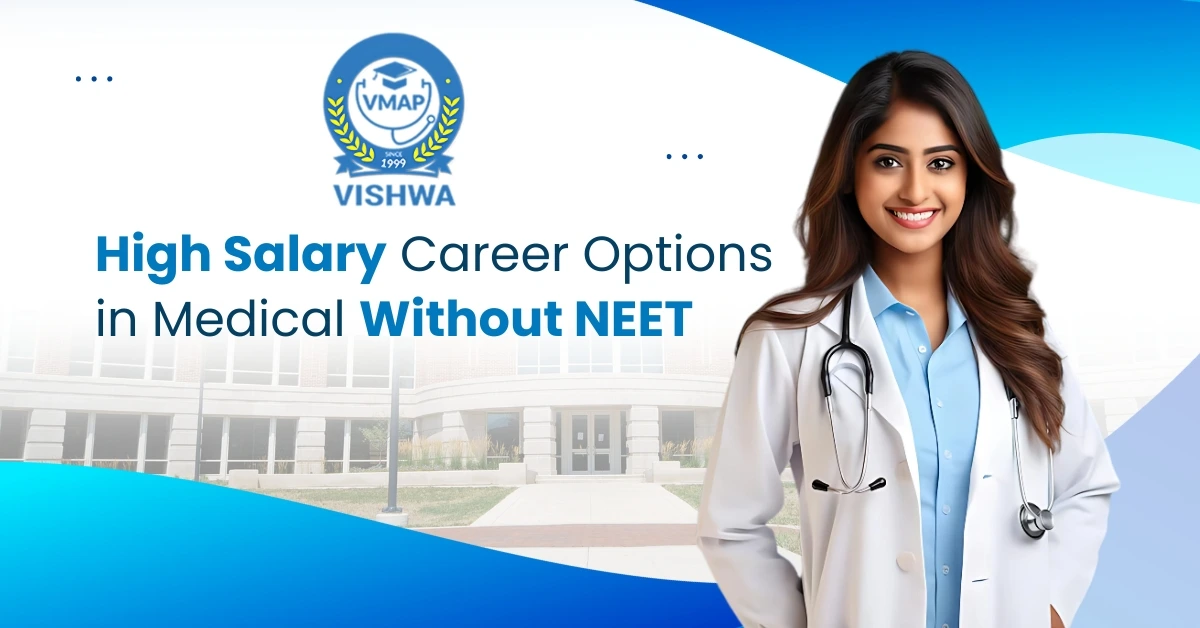Students who have completed 12th grade can pursue optometry courses after 12th to enter the healthcare field. At Vishwa Medical Admission Point, we’ve guided thousands of students toward fulfilling medical careers, including optometry and MBBS programs.
In this blog, we’re diving into everything you need to know about optometry courses after 12th, from who can apply to the kinds of jobs you can get. We’ll also talk about how we can support you if you want MBBS programs abroad. At Vishwa Medical Admission Point, our aim is to share straightforward, trustworthy info to help you choose the best path for your future.
What Is an Optometry Course?
It’s a program that teaches you how to check eyes, spot vision problems, and help people see better. You’ll learn to prescribe glasses or contact lenses and even catch eye diseases early, working with doctors to keep patients’ eyes healthy. Unlike MBBS, which covers all kinds of medicine, optometry focuses just on eyes, so it’s a great way to dive into healthcare without studying everything.
For example, the World Health Organization says that by 2030, the world will need 1 million more eye care professionals.
Why Choose Optometry Courses After 12th?
Picking optometry courses after 12th is a solid move if you want a career that’s steady and needed but don’t want the stress of MBBS exams like NEET. Here’s why it’s worth considering:
- Lots of Jobs: India will need about 1,00,000 optometrists by 2030 to help over 300 million people with eye vision problems.
- Quicker Training: Most optometry courses take 4 years, while MBBS takes 5.5 years.
- Work Anywhere: You can get jobs in hospitals, clinics, or even start your own eye care shop, with big demand in places like the UK and USA.
- No NEET Needed: Unlike MBBS, you usually don’t need NEET for optometry, so it’s easier to get started.
For example, at Vishwa Medical Admission Point, we helped Priya from Kolkata pick optometry over MBBS because it suited her goals. She’s now happy in her career. But if MBBS is your thing, we can also guide you to budget-friendly programs abroad, like we did for Anil from Chennai, who’s studying at Akaki Tsereteli State University in Georgia.
Eligibility Criteria for Optometry Course
Eligibility requirements for optometry courses explained simply for students after 12th:
- School: You need to finish 12th grade with Physics, Chemistry, and Biology (PCB) or Math from a proper board.
- Marks: Most colleges want at least 50% in PCB. Some, like AIIMS Delhi, might ask for 60%.
- Age: You should be 17 or older when you apply.
- Exams: NEET isn’t usually needed, but some places, like Dr. Agarwal’s Institute of Optometry, have their own tests.
Take the example of Neha from Mumbai – she got admission to BSc Optometry program at Brainware University with our help. We made sure that her application showed her 55% PCB marks and had all the right documents.
Optometry Course Details
These courses typically take 4 years, such as B.Optom or BSc Optometry. Here’s a quick overview:
- Study: The curriculum includes eye anatomy, visual science, and diagnosing vision problems. You’ll also receive practical training with optical instruments.
- Practical Knowledge: In your final year, you’ll do lab work and a 1-year internship to get hands-on experience with real patients.
- Best Colleges: Top colleges like AIIMS Delhi, SRM Medical College, and Dr. Agarwal’s Institute offer excellent optometry programs.
A balanced approach of academic learning and clinical training ensures you’re confident in patient care.
Optometry Course Duration
It’s usually 4 years—3 years of classes and 1 year of internship. There are also 2-year diploma courses if you want to start working faster. Compared to MBBS, which takes 5.5 years and more for specialties, optometry gets you into healthcare quicker. That’s why Ankit, one of our students, went for optometry—it saved him time.
How to Become an Optometrist
Here’s a clear plan to help you pursue a successful career in optometry:
- Finish 12th Grade: Make sure you’ve got PCB or Math with at least 50% marks.
- Pick a Course: Apply for a B.Optom or BSc Optometry at a good college. See if they have an entrance test.
- Study and Train: Do 3 years of classes and a 1-year internship.
- Get a License: Sign up with the Optometry Council of India so you can work legally.
- Start Working: Join a clinic, hospital, or open your own eye care shop. You can also study more, like an M.Optom, to specialize.
We helped Soham from Kolkata, who didn’t pass NEET, get into a BSc Optometry program at PGI Pithoragarh. Now he’s doing great, earning ₹4 lakh a year at a clinic.
How to Choose MBBS Colleges for Indian Students
Figuring out how to choose MBBS colleges for Indian students can feel tough, especially since only 1,18,915 MBBS seats exist in India for 24 lakh NEET takers in 2024. Here’s what to think about:
- Official Approval: Pick colleges approved by the National Medical Commission (NMC), like AIIMS Delhi, for solid training.
- Hospital Links: Colleges with strong hospitals, like Christian Medical College, give you better hands-on practice.
- Cost: Government colleges charge ₹10,000–₹1 lakh a year, while private ones can hit ₹8–₹30 lakh. Abroad, places like Russia or Georgia cost about ₹20 lakh for the whole course.
- Where It Is: Studying abroad can give you many opportunities, but check visa rules and living costs.
We make this easier at Vishwa Medical Admission Point. For example, we got Meera from Jaipur into an MBBS program in Kyrgyzstan, handling her application and visa, and saved her family ₹30 lakh compared to Indian private colleges.
Career Scope and Salary After Optometry Courses
India’s eye care industry will grow tremendously by 2030 as more people need help with their eyesight. Here’s what you can do:
- Optometrist: Work in hospitals or clinics, earning ₹3–6 lakh a year to start. With experience, you could make ₹12–15 lakh.
- Your Own Clinic: Start an eye clinic, possibly earning ₹10–15 lakh a year.
- Research or Teaching: Study more (like M.Optom or PhD) to teach or do research on new eye care ideas.
MBBS grads might earn ₹6–10 lakh to start, but their training takes longer. Optometry’s quick path and big demand make it a great pick.
Why Trust Vishwa Medical Admission Point?
At Vishwa Medical Admission Point, we’ve spent 25 years helping over 10,000 students to pursue their medical dreams, whether it’s optometry or MBBS abroad. Here’s what we bring:
- Custom Advice: We identify courses tailored to your career goals and financial plan. For example, Neha’s passion for gadgets led us to suggest optometry over nursing.
- Full Support: We handle applications, visas, and more, like we did for Anil’s MBBS in Georgia.
- Real Know-How: Our team keeps up with NMC rules and global education trends to give you spot-on advice.
We’re not just advisors—we’re your partners in building a great future. Check out vmap.co.in to see how we can help.
Conclusion
Choosing optometry courses after 12th is a smart step toward a rewarding career in eye care. With growing demand, flexible career options, and no NEET requirement, optometry offers a practical alternative to MBBS. At Vishwa Medical Admission Point, we’re here to guide you through every step, whether you choose optometry or MBBS abroad. Contact us today at vmap.co.in to explore your options and take the first step toward a bright future in healthcare.
Also Read
Clinical Research Courses After 12th
Dermatology courses after 12th
Lab technician course after 12th
Paramedical Courses After 12th









